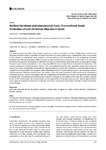Mostrar o rexistro simple do ítem
Welfare Paradoxes and Interpersonal Pacts: Transnational Social Protection of Latin American Migrants in Spain
| dc.contributor.author | Oso, Laura | |
| dc.contributor.author | Martínez-Buján, Raquel | |
| dc.date.accessioned | 2022-04-04T16:12:09Z | |
| dc.date.available | 2022-04-04T16:12:09Z | |
| dc.date.issued | 2022 | |
| dc.identifier.citation | Oso, L., Martínez-Buján, R. (2022). Social Inclusion, 10(1), 194-204. https://doi.org/10.17645/si.v9i4.4639 | es_ES |
| dc.identifier.issn | 2183–2803 | |
| dc.identifier.uri | http://hdl.handle.net/2183/30395 | |
| dc.description | Nome do exemplar: Transnational Social Protection: Inclusion for Whom? Theoretical Reflections and Migrant Experiences | es_ES |
| dc.description.abstract | [Abstract] This article analyses the relationship between migration, care work, and welfare provision, highlighting the role of Latin American migrants in Spain as providers of formal and informal social protection on a transnational scale. It contributes to the debate on transnational social protection and transnational social inequalities from the perspective of welfare paradoxes and interpersonal pacts. Migrant women in Spain have become a resource for the provision of formal social protection through their employment as domestic care workers. Nevertheless, given that access to social rights in Spain depends on job stability and residency status, they have difficulties in accessing formal social protection themselves. This process constitutes a “welfare paradox,” based on the commodification and exclusion paradoxes, explained by structural factors such as the characteristics of the welfare regime (familiaristic model, with a tendency to hire domestic workers as caregivers into households), the migration regime (feminised and with a clear leaning towards Latin American women), and the economic landscape resulting from two systemic crises: the great recession of 2008 and the Covid‐19 pandemic. Interpersonal pacts, rooted in marriage/couple and intergenerational agreements, and their infringements, are analysed to explain the transnational and informal social protection strategies in the context of the “exclusion paradox” and the breach of the “welfare pact.” Our research draws on the exploitation of secondary data and multi‐sited, longitudinal fieldwork based on biographical interviews conducted with various members of transnational families in Spain and Ecuador (41 interviews). | es_ES |
| dc.language.iso | eng | es_ES |
| dc.publisher | Cogitatio | es_ES |
| dc.relation.uri | https://doi.org/10.17645/si.v9i4.4639 | es_ES |
| dc.rights | Licencia Creative Commons Attribution 4.0 International License (CC BY) | es_ES |
| dc.rights.uri | http://creativecommons.org/licenses/by/3.0/es/ | * |
| dc.subject | Care work | es_ES |
| dc.subject | Domestic service | es_ES |
| dc.subject | Ecuadorian migration | es_ES |
| dc.subject | Gender roles | es_ES |
| dc.subject | Immigration in Spain | es_ES |
| dc.subject | Social protection | es_ES |
| dc.subject | Transnational families | es_ES |
| dc.subject | Welfare | es_ES |
| dc.title | Welfare Paradoxes and Interpersonal Pacts: Transnational Social Protection of Latin American Migrants in Spain | es_ES |
| dc.type | info:eu-repo/semantics/article | es_ES |
| dc.rights.access | info:eu-repo/semantics/openAccess | es_ES |
| UDC.volume | 10 | es_ES |
| UDC.issue | 1 | es_ES |
| UDC.startPage | 194 | es_ES |
| UDC.endPage | 204 | es_ES |
Ficheiros no ítem
Este ítem aparece na(s) seguinte(s) colección(s)
-
GI-ESOMI - Artigos [83]






